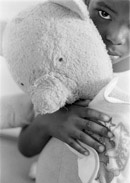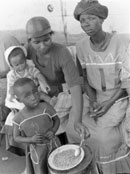
By Kelly St. John
KHAYELITSHA, South Africa — Siphokazi is eight years old, and cannot write her last name. Last year was not a year for school, but for police stations and HIV tests. Siphokazi was raped.
Siphokazi is a statistic in the country with the world's highest per capita rates of rape. For South African companies marketing "rape insurance," she is also a sales pitch.
Doctors believe Siphokazi was raped at least ten times, by her uncle. So far, HIV tests have come back negative. But, said mother Nancy Matutu, not all news is good. Siphokazi is scared of men, including her own father. And she will probably never have children.
Siphokazi proudly shows off the bedroom she shares with three younger siblings, in a modest yet tidy brick house in this township outside Cape Town. Out of her mother's earshot, she hugged a worn blue bear and recalled her ordeal.
"I was sad," she said, "because I made my mother cry."
In South Africa, the only thing that makes Siphokazi's story exceptional is that it is so common. Fifty-four thousand people reported rapes to South Africa's police in 1998. Here, a woman is five times more likely to be raped than in the United States.

Rape victim Siphokazi Matutu, 8, hides behind her teddy bear. An estimated one in three South African girls is raped by her 18th birthday. Photo by Mimi Chakarova. |
HIV-AIDS is also spreading faster in South Africa than anywhere else in the world. According to South Africa's government, four million of its 43 million people have HIV and 1,700 more are infected daily. Here, rape can be more than just a devastating act of violence. It can be a death sentence.
But many South African women are saying it shouldn't be. A course of anti-retroviral drug treatments could cut a rape victim's risk of contracting HIV, but these drugs are not covered by the government's health system. Five insurance companies have stepped in, helping women with means to take care of themselves.
Fifty-thousand South Africans are insured by the LifeSense Rape Care policy, underwritten by Lloyds of London. After a rape, policy holders receive a triple cocktail of anti-retroviral drugs for 28 days and free HIV testing for one year. The policy also covers the morning after pill, counseling, alternative therapy, and security upgrades for the home.
Policyholders pay less than $2 each month for the LifeSense insurance, which is sold through employers. In contrast, a one-month supply of three anti-retroviral drugs costs consumers as much as $833. That's no small price considering South Africa's per capita household income is $2,880, according to the World Bank.
Audrey Potter, who helped design the LifeSense policy, made a convincing pitch. "We do make money out of it, but we don't make a lot," she said. "The government is doing nothing about rape. They're burying their heads in the sand. Companies are stepping in and its their social responsibility, because no one else is going to do it."
LifeSense's brochures include frightening statistics. A Cape Town hospital reports that three-fourths of the rape victims it sees are gang raped. One in two South African women is raped in her lifetime. The Johannesburg Hospital estimates that 40 percent of men 20-29 are HIV-positive. This is the age group of most of South Africa's rapists.
"And rape victims are treated appallingly" by the system that is supposed to help them, Potter continued. Rape survivors receive shabby medical treatment, and are sometimes not even told about the existence of drugs that could prevent HIV transmission.
There have been sporadic reports of rape victims being raped again in police stations. Fewer than 20 percent of rapes in 1998 were prosecuted, and just nine percent of reported rapes in South Africa ultimately result in a conviction.
"If it happened to me here, I wouldn't report it," said Potter, who pushed successfully for LifeSense to cover rapes regardless if they are reported to the police.
Commercial General Union became the first South African insurer to issue rape insurance last year, and from the beginning the policies have drawn fire from critics. While the policies cover HIV testing, they make no provision for HIV-AIDS care if a woman tests positive for the disease, critics say. And, some argue, medical care after a rape should be an integral part of all medical insurance and the health care system, not an optional benefit.
People Opposing Women Abuse, a Johannesburg-based advocacy group, criticized the police for profiting on women's misfortune and suggested the money would be better spent helping police deal with the increase in rape cases. LifeSense does donate a portion of its profits to organizations combating rape.
The debate over rape insurance is one that centers on class, and since much of the country's wealth is held by the white minority, the issue of class inevitably turns to race. Rape insurance is a new concept, but it follows an old trend, said People Opposing Women Abuse's director Nthabiseng Sepanya. People who can afford it, typically affluent whites, spend their money to opt out of the system all together. Meanwhile, the vast majority of the country's women are left with their lot.
In that vein, rape insurance is not much different than companies that have helped whites flee the country since the end of apartheid. "The people who are saying they can't take walks, they've never taken walks. Before they were scared of communists," Sepanya said. "Now, it's rapists."
|
South African women live at a dangerous intersection: thw world's highest rates of rape and the fastest spread of HIV-AIDS. Women in townships like this (Gugulethu) are most at risk, but least able to afford insurance or medical care to reduce their chances of contracting HIV. Photo by Mimi Chakarova. |
Still, South Africa's high crime rate and increasing rates of HIV transmission make the policies attractive. And arguing over the validity of these policies is peripheral to the broader question about rape and HIV-AIDS, said Helen Rees, director of the Reproductive Health Research Unit at Chris Hani Baragwanath public hospital in Soweto.
LifeSense's brochures tell patients that anti-retroviral drugs like AZT and 3TC taken within 72 hours of the rape will lessen their odds of contracting HIV by up to 81 percent. That estimate is extrapolated from studies of health care workers pricked by HIV-infected needles, because no study about rape and HIV transmission has been completed.
"At the individual patient level, physicians want to prescribe these drugs, even though there's no direct science" to attest to their effectiveness, Rees said.
"The government is saying 'We've only got so much money and we don't even know if these drugs work.' But individual physicians are acting on scientific logic, if not hard science," Rees said. "They're equally right."
People Opposing Women Abuse may be critical of rape insurance, but it stands with one of LifeSense's biggest supporters — journalist and rape survivor Charlene Smith — in lambasting the government of President Thabo Mbeki over anti-retroviral treatments for rape victims. "If they cannot guarantee us safety," said Sepanya, "they must provide remedies once we've been violated."
Smith sparked a furor last year when she wrote about her own rape and her difficulty in obtaining anti-retroviral drugs in a national newspaper. She has taken the state to task over its failure to buy AZT. "With regard to the high cost of anti-retrovirals, the government is talking absolute garbage," Smith fired away by email to a reporter.
Glaxo-Wellcome, the American drug company which holds the patent for AZT, reduced its price for South Africa to about $67 for a 28-day supply, Smith told a delegation of American congressmen last December. South Africa rejected the offer.
Advocates say the government's call for more study about HIV and rape is a smokescreen, because the government has not responded in other policy areas even when the evidence is clear. Widely-accepted research in Europe and America found that the drug AZT halves an HIV-positive mother's chance of infecting her newborn infant, but South Africa still does not give the drug to pregnant women.
In the mammoth Chris Hani Baragwanath hospital, no rape victim has ever arrived with rape insurance coverage. When asked about the policies, on-duty police officer Philadelphia Poulsen not only said she had never heard of such a thing, she asked for the name of a company that sells it and a phone number.
In this place, where it is the rare victim who could afford anti-retroviral drugs, "rape insurance sounds like a pretty good idea," Poulsen said.
Chief nurse Sally Mbulanheni waited patiently in the cheery yellow room where Baragwanath's rape victims are first received. In February, Baragwanath treated 110 women, 153 girls, 6 men, and 15 boys for rape. This afternoon is quiet.
"It depresses me, the conditions. To be hearing of rape, especially when it is a child. I have a two-year-old daughter myself," Mbulanheni said. "Put yourself in the situation of that person. You contract HIV and there's no help for you."
Baragwanath does not report how many of its rape cases involved multiple attackers, but Mbulanheni offered an informal sample. She flipped open the center's logbook and ran her finger down the first random page.
"Here's three men, then two, then four on the same day," she read. "Oh, and three days later, here's someone who was raped by 10. At the age of 20, raped by 10 men."
Rapes of white women by black men garner a disproportionate amount of media attention, but most victims are black women and girls attacked by black men, usually someone they know. Professionals give a litany of theories about why rape here is so prevalent: poverty and unemployment are endemic, women hold a low status in society, and with its roots in apartheid, the country has a unique tradition of violence.
"You can't understand rape, but you can understand some of the anger here," LifeSense's Potter said. "Kids here have seen people set on fire, seen their parents dragged off and tortured."
In the impoverished squatter camps of Alexandra, outside Johannesburg, poverty makes women vulnerable. Families live and sleep together in one room shanties, exposing girls to predatory older relatives. The streets are unlit, and women lucky enough to have jobs often have to walk long distances alone to get there.
Counselors also say some child rapes are attributed to an alarming urban myth: that a man can rid himself of HIV if he has sex with a virgin.
Prince Masina, an ex-con who now coordinates a prison project to reduce violence against women, said that rape in the townships is often committed by career criminals.
"It's the elite gangs, those that have got the money from robbing and stealing cars. What the statement they are making is, 'We control everything'," Masina said.
Or, as often happens, a man who feels slighted by a woman or girl will come back with his friends to punish her. "Since the 1980s, it's been fashionable to take women by force and use them," Masina said. "It's not about lust, or because these men cannot enter a relationship. It's about having the last word all of the time."
It's hard not to walk away from South Africa's crisis counselors without a distinct impression — that a stranger could throw a stone into this Alexandra crowd and hit a woman with a horrific story of abuse to tell.
And in a way, that's the case. This first woman stopped on the street is Nothemba Sulupha, a bright 18-year-old student with closely cropped dreadlocks. Asked about rape, Sulupha clicked her tongue.
"Well, we all have our experiences," she said, reluctantly disclosing that she was sexually molested by her cousin. "It's happened to most of my friends, and most of the people I've come across. You're expecting it to happen, and if it doesn't, you're lucky," she said.
"Rape actually becomes boring. You can't sympathize with people anymore because it's overdone."
